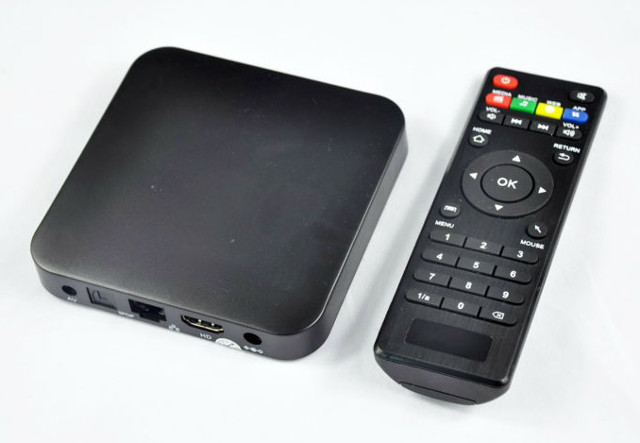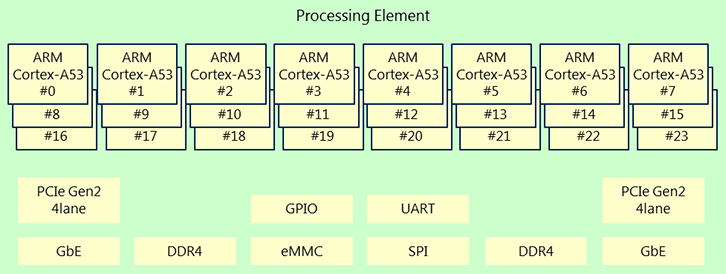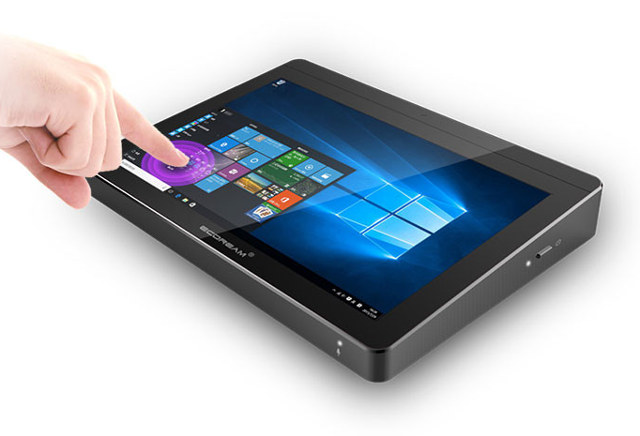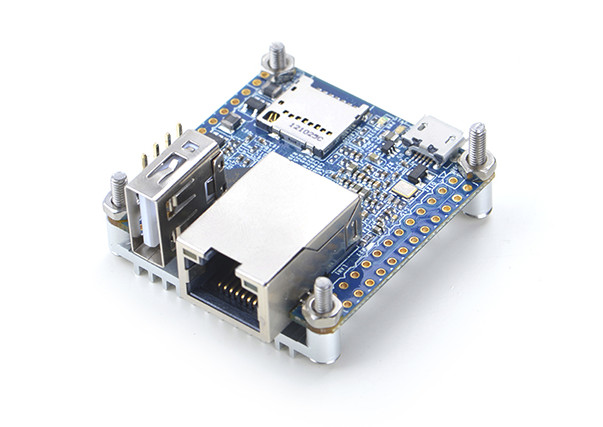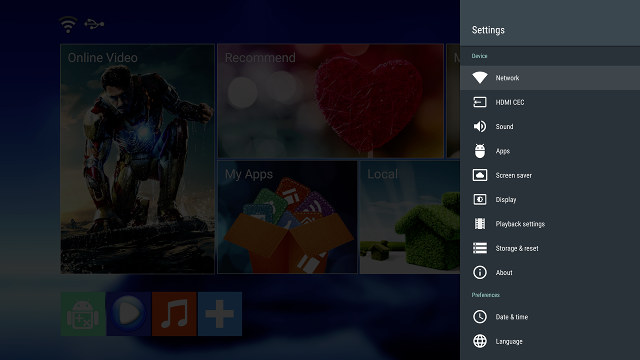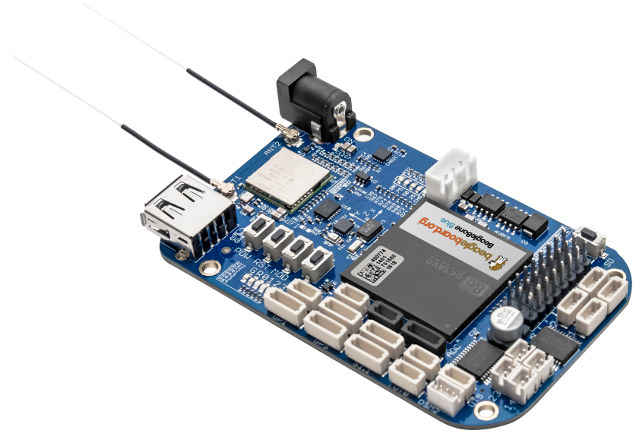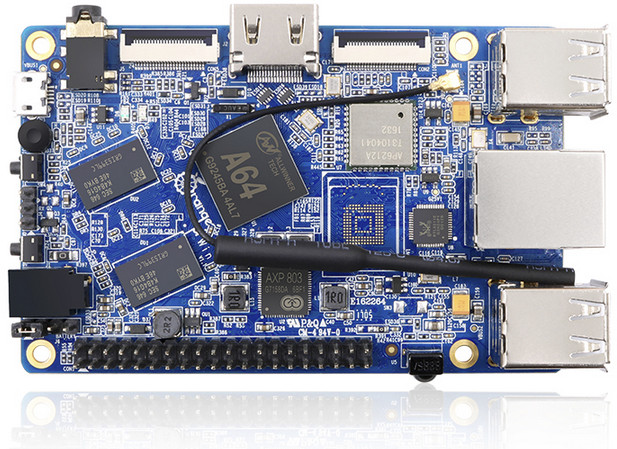There are plenty of Android TV boxes powered by Amlogic S905X processor on the market, but ACEMAX has apparently decided to leverage the community’s work on LibreELEC, and launched two “ACEMAX LE” models with 1GB RAM/8GB flash or 2GB/16GB that runs LibreELEC sold on Aliexpress for respectively $39.99 and $57.99 shipped. You can also buy the second model with a dual boot Android 6.0 + LibreELEC firmware for $59.99 including shipping, instead of only running LibreELEC. The company uses both “OpenELEC”, “LibreELEC” and “Pure Linux”, but the video demo embedded at the end of this post shows clearly the box booting LibreELEC 7 with Kodi 16.1. ACEMAX LE TV box specifications: SoC – Amlogic S905X quad core ARM Cortex-A53 @ up to 1.5GHz with penta-core Mali-450MP GPU System Memory – Model 1: 1GB RAM; model 2: 2GB RAM Storage Model 1: 8GB eMMC flash + micro SD card slot Model […]
MYiR Tech MYC-JA5D2X System-on-Module is Powered by Microchip ATSAMA5D2 Cortex A5 Processor
MYIR Tech has released MYC-JA5D2X system-on-module powered by a Microchip Atmel SAMA5D2 ARM Cortex A5 processor with 256MB flash, and 256 MB DDR3. The module relies on a SO-DIMM edge connector to expose the camera interface, Ethernet, USB, camera, and other I/O signals. MYC-JA5D2X CPU module specifications: SoC – Atmel SAMA5D26 or SAMA5D27 ARM Cortex A5 processor @ up to 500 MHz with 128KB L2 cache System Memory – 256MB DDR3 SDRAM Storage – 256MB NAND flash, 4MB data flash, 64KB EEPROM Connectivity – On-board 10/100M Ethernet PHY 200-pin SO-DIMM edge connector with: 1x Ethernet 1x USB Host, 1x USB Device, 1x USB HSIC (HSIC is only for SAMA5D27) Up to 10x serial ports, up to 2 x CAN (only for SAMA5D27) Up to 7 x I2C, up to 7 x SPI Up to 2 x QSPI 12 x 12-bit ADC (enhanced resolution up to 14 bits) 4x PWM 1x […]
Socionext SC2A11 Low Power Server Processor Comes with 24 Cortex-A53 Cores, Scales up to 1536 Cores via PCIe
Socionext SC2A11 is an 24-core (tetracosa) ARM Cortex-A53 processor designed for low-power server system suitable for edge computing, web server & indexing, cloud computing, and any applications that do not require high single thread peak performance. The company also designed SC2A20 switch SoC that allows up to 64 SC2A11 processors (1536 cores) to communicate over PCI Express using Socionext DDT (Direct Data Transaction). SC2A11 SoC specifications: Processor – 24x ARM Cortex-A53 MPCore cores @ up to 1GHz, with 32KB/32KB I/D L1 cache, 256 KB L2 cache, and 4MB L3 cache Memory I/F – DDR4-2133Mbps 64-bit + ECC Flash I/F – HSSPI, eMMC PCIe – PCI Express Gen2, Root/Endpoint select, 4 lanes (2 systems/ for SoC IF) LAN – 2x 1Gbps with IPSec Network Offload Engine (wire-speed) Serial I/F – UART, I2C, GPIO The company did not provide any info about software, but it’s safe to assume it’s running Linux. There’s […]
ECDREAM EC-V26 is a Mini PC with a 8″ Touchscreen Display Powered by an Intel Celeron/Pentium Apollo Lake Processor
Mini PCs with a touchscreen display targeting consumer markets, and looking like very thick tablets started with PiPo X8, and later other companies joined the fray with products like GOLE 1, but the form factor appears to have become popular with even more manufacturers, as Shenzhen EC Technology has now launched ECDREAM EC-V26 powered by Intel Celeron or Pentium “Apollo Lake” processor, and equipped with an 8″ touchscreen display. ECDREAM EC-V26 mini PC specifications: SoC (one of the other) Intel Celeron N3350 dual core processor @ 1.1 GHz / 2.4 GHz with a 12 EU Intel® HD Graphics 500; 6W TDP Intel Celeron N3450 quad core processor @ 1.1 GHz / 2.2 GHz with a 12 EU Intel® HD Graphics 500; 6W TDP Intel Pentium N4200 quad core processor @ 1.1 GHz / 2.5 GHz with an 18 EU Intel HD Graphics 505; 6W TDP System Memory – 2GB on-board […]
NanoPi NEO2 Development Board Powered by Allwinner H5 64-bit ARM Processor Sells for $15
NanoPi NEO is a cool little board, and I’ve been using it with Armbian as a 24/7 MQTT + Domoticz server for several weeks without any issues so far. FriendlyElec has now an update with NanoPi NEO2 featuring Allwinner H5 quad core Cortex A53 processor instead of Allwinner H3 Cortex A7 processor, a faster Gigabit Ethernet connection, and a new audio header. NanoPi NEO2 specifications: SoC – Allwinner H5 quad core Cortex A53 processor with an ARM Mali-450MP GPU System Memory – 512 MB DDR3 Storage – micro SD card slot Connectivity – Gigabit Ethernet (via RTL8211E-VB-CG chip) USB – 1x USB 2.0 host ports, 1x micro USB OTG port, 2x USB via headers Expansion headers 24-pin header with I2C, 2x UART, SPI, PWM, and power signals 12-pin header with 2x USB, IR pin, I2S 5-pin audio header with microphone and LINE out signals Debugging – 4-pin header for serial […]
Android 7.1 Nougat on Amlogic TV Boxes – A First Quick Look
Last year, we found out that Amlogic was working on Linux 4.4, possibly for their Android 7.0 Nougat SDK. As a developer who signed all relevant NDAs, Stane1983 has now been working on Amlogic Android 7.0 for a few day, and reported some of his findings. First Amlogic source code is based on Android 7.1.1 R6 (NMF26Q), but still with Linux 3.14.29, possibly because Mali-T830 GPU drivers are still r11p0, and Linux 4.4 may come later. One good thing is that the Nougat SDK supports 64-bit Android OS instead of the 32-bit Android we are all currently using in our TV boxes. A not-so-good news is that internal storage partitions have changed, which means most current TV boxes are unlikely to get an update, becau it may not be possible to perform OTA updated, and instead would require an updated via Amlogic USB burning tool. But let’s look at the […]
$80 BeagleBone Blue Board Targets Robots & Drones, Robotics Education
Last year, we reported that BeagleBoard.org was working with the University of California San Diego on BeagleBone Blue board for robotics educational kits such as EduMiP self-balancing robot, and EduRover four wheel robot. The board has finally launched, so we know the full details, and it can be purchased for about $80 on Mouser, Element14 or Arrow websites. BeagleBone Blue specifications: SiP (System-in-Package) – Octavo Systems OSD3358 with TI Sitara AM3358 ARM Cortex-A8 processor @ up to 1 GHz, 2×32-bit 200-MHz programmable real-time units (PRUs), PowerVR SGX530 GPU, PMIC, and 512MB DDR3 Storage – 4GB eMMC flash, micro SD slot Connectivity – WiFi 802.11 b/g/n, Bluetooth 4.1 LE (TI Wilink 8) with two antennas USB – 1x USB 2.0 client and host port Sensors – 9 axis IMU, barometer Expansion Motor control – 8x 6V servo out, 4x DC motor out, 4x quadrature encoder in Other interfaces – GPIOs, 5x UARTs, 2x […]
$25 Orange Pi Win Development Board To Run Windows 10 IoT (and Linux, and Android)
Shenzhen Xunlong Software must already have over a dozen of Orange Pi boards, but this is not stopping them from launching more, and the company has just introduced Orange Pi Win, powered by Allwinner A64 processor, and beside supporting Linux and Android like other models, it’s rumored to run Windows 10 IoT too.Orange Pi Win specifications: SoC – Allwinner A64 quad core ARM Cortex A53 processor @ 1.2 GHz with Mali-400MP2 GPU System Memory – 1 GB DDR3 Storage – 2MB SPI flash, micro SD slot up to 64 GB, footprint for optional eMMC flash Video Output / Display interface – HDMI 1.4 up to 4K @ 30 Hz with CEC 3D and HDCP support,, MIPI LCD interface Audio – HDMI, 3.5 mm headphone jack, built-in microphone Connectivity – Gigabit Ethernet + 802.11 b/g/n WiFi & Bluetooth 4.2 (AP6212) USB – 4x USB 2.0 host ports, 1x micro USB OTG […]


